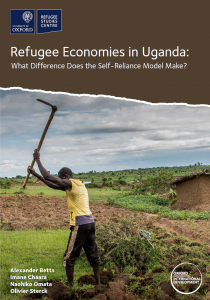Shocks, Vulnerability, and Livelihoods - Refugee Economies
Credit: UNHCR / F. Noy, CC BY-NC-SA 2.0
Shocks, Vulnerability, and Livelihoods
Many refugees have specific vulnerabilities specifically linked to their refugee status. This includes, 1) being more exposed to shocks, 2) having an unequal access to entitlements and resources, and 3) having limited options for coping with shocks.
Through this research, we aim to understand the main coping strategies used by refugee households in case of negative shocks, and propose ways that these coping strategies can be strengthened.
Refugees frequently face sudden and often unpredictable disruptions to their economic lives. These vulnerabilities arise for three reasons:
- Refugees are more exposed to shocks. Refugees are frequently victims of theft, harassment, discrimination, and aggression, and they are much more likely to suffer from problems associated with their physical and mental health. For those living in camps, disruptions and reductions in humanitarian assistance are frequent.
- The legal status of refugees does not grant them the same level of entitlements as host country nationals. Access to health care, education, employment, and social benefits are unequal. In most cases, the situation of asylum seekers and irregular migrants is even worse.
- Refugees often have limited options for coping with shocks. Those in low-income settings often rely on networks to cope with shocks. In some cases, individuals sell their assets or take up extra employment. However, these options are often not available to refugees due to low employment rates, lack of assets, and ineffective informal social protection mechanisms.
This project will contribute to the academic and policy literature by 1) identifying the main shocks faced by refugees and their impact on living standards, 2) examining the coping strategies adopted by refugees when faced with individual-level and community-level shocks, and 3) developing new ways for refugees to overcome vulnerability and over-indebtedness.

